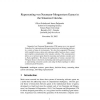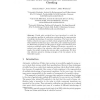40 search results - page 3 / 8 » Concurrent Games and Full Completeness |
CORR
2010
Springer
13 years 5 months ago
2010
Springer
We consider two-player zero-sum games on graphs. These games can be classified on the basis of the information of the players and on the mode of interaction between them. On the ba...
JANCL
2007
13 years 5 months ago
2007
ABSTRACT. This paper provides a complete characterization of epistemic models in which distributed knowledge complies with the principle of full communication [HOE 99, GER 99]. It ...
AMAI
2004
Springer
13 years 5 months ago
2004
Springer
Sequential von Neumann-Morgernstern (VM) games are a very general formalism for representing multi-agent interactions and planning problems in a variety of types of environments. ...
LICS
2009
IEEE
13 years 11 months ago
2009
IEEE
Abstract. Ludics is peculiar in the panorama of game semantics: we first have the definition of interaction-composition and then we have semantical types, as a set of strategies ...
FSTTCS
1998
Springer
13 years 9 months ago
1998
Springer
Partial order methods have been introduced to avoid the state explosion problem in veri cation resulting from the representation of multiple interleavings of concurrent transitions...


